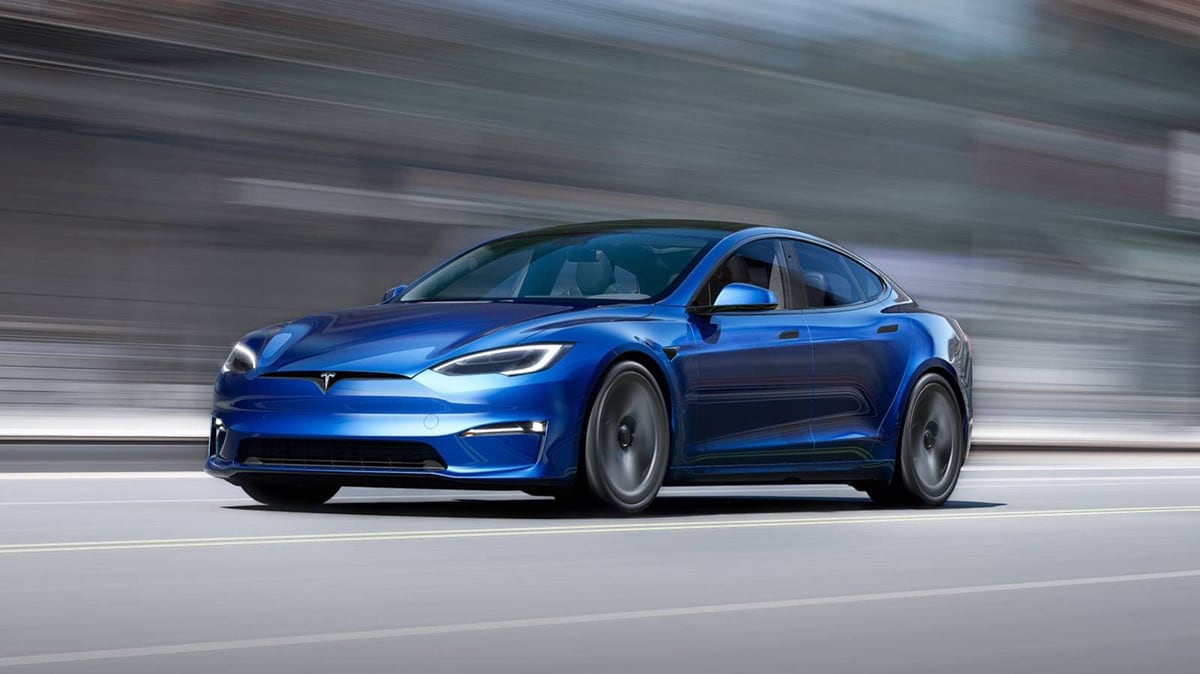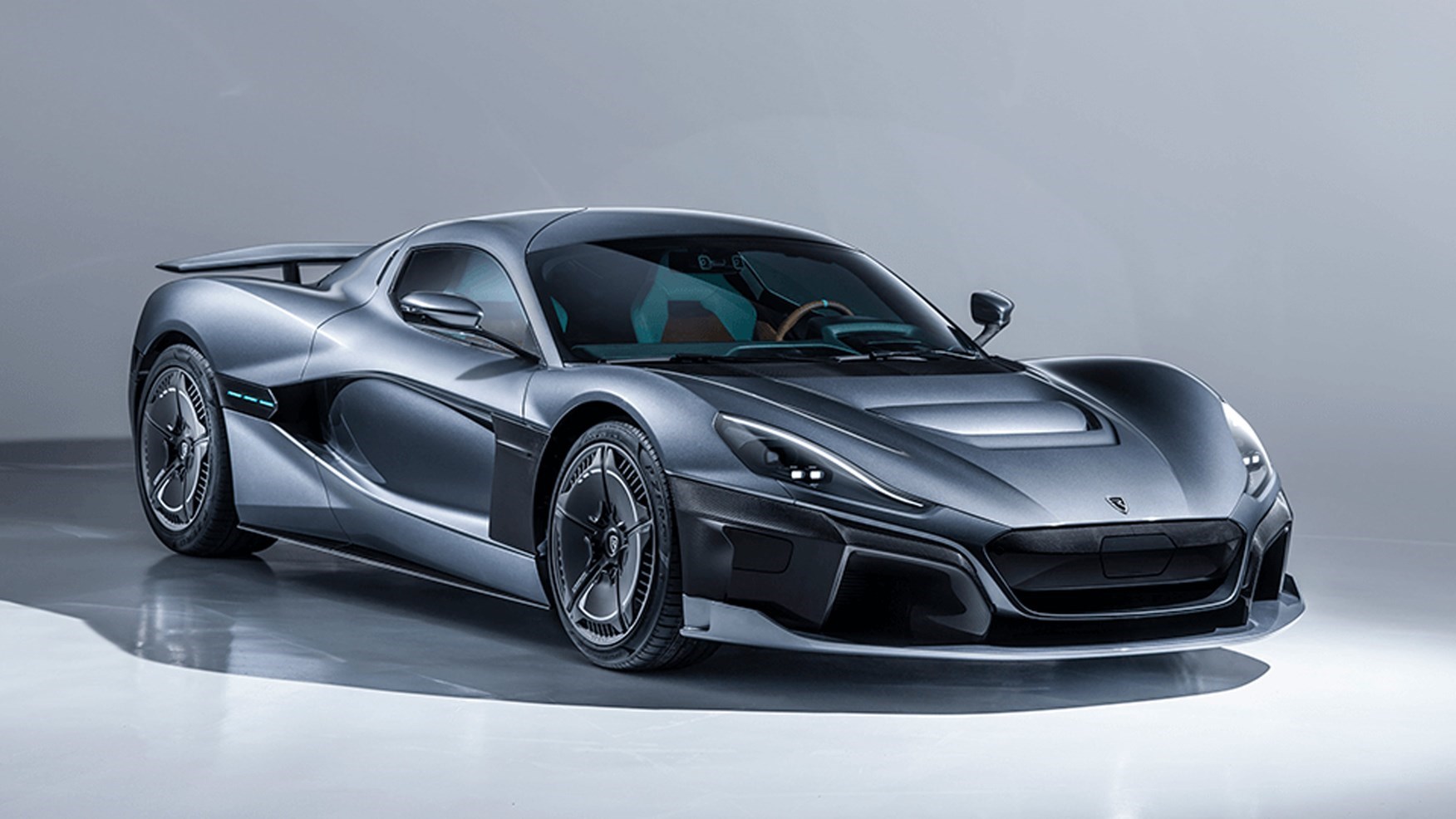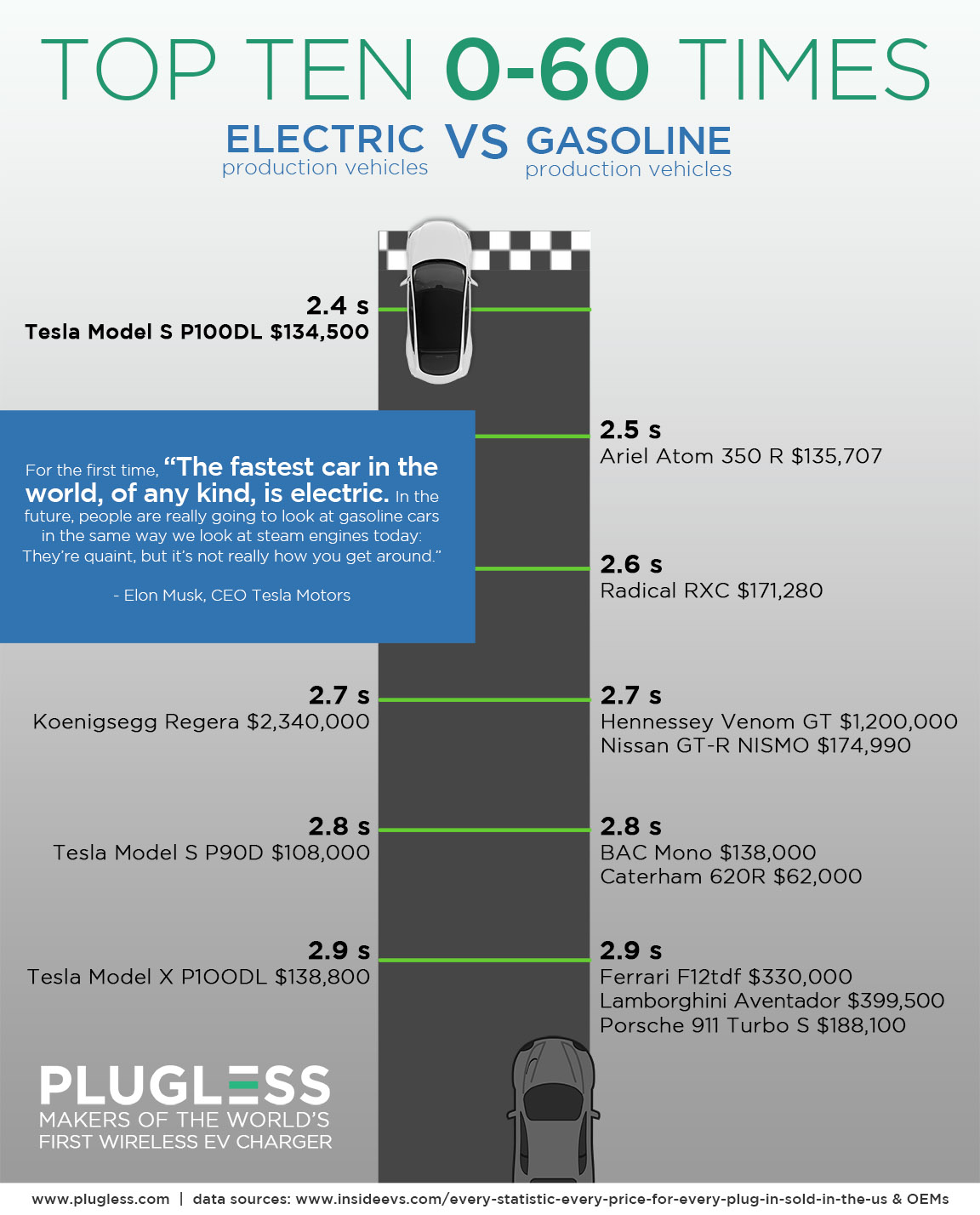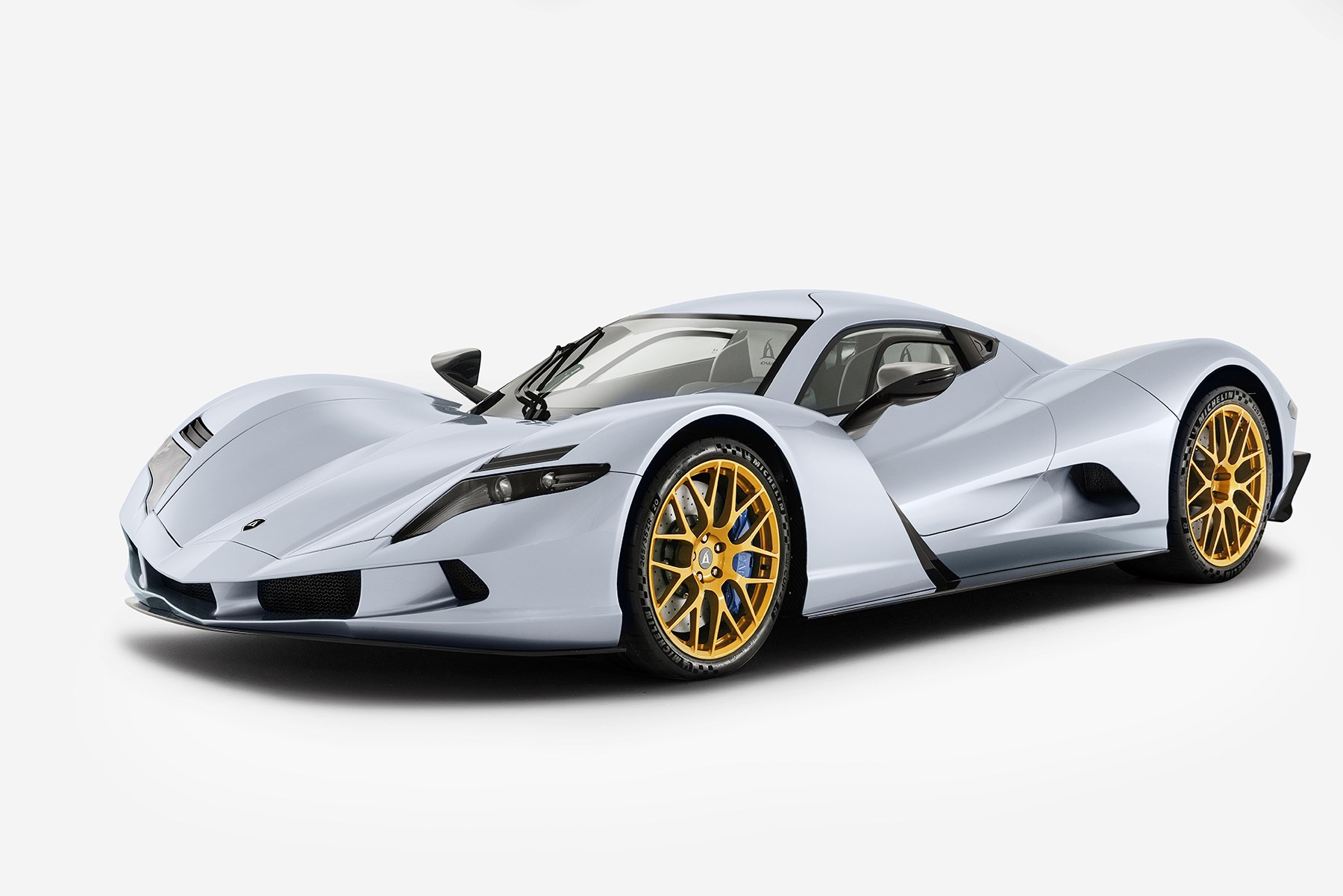The fastest electric cars include the Tesla Model S Plaid and the Rimac Nevera. They offer exceptional acceleration and speed.
Acceleration of Electric Cars what you need to know : Electric cars have revolutionized the automotive industry, especially in terms of speed and acceleration. Modern electric vehicles (EVs) can achieve remarkable 0-60 mph times, rivaling and often surpassing traditional internal combustion engine vehicles. Models like the Tesla Model S Plaid boast a 0-60 mph time of just under 2 seconds.
The Rimac Nevera, another speed demon, reaches 60 mph in a blistering 1. 85 seconds. These advancements highlight the potential of electric powertrains to deliver unparalleled performance. Enthusiasts and consumers alike are drawn to the instant torque and smooth acceleration that EVs provide, making them a thrilling choice for speed lovers.

Credit: www.notateslaapp.com
Introduction To Electric Car Acceleration
Electric cars are not just about being eco-friendly. They offer thrilling acceleration. The feel of instant torque is unmatched. This makes driving an electric car exciting. Let’s explore why speed matters and the tech behind it.
Importance Of Speed
Speed in electric cars offers more than fun. Quick acceleration boosts safety. Merging onto highways becomes easier. Passing slower vehicles is smoother. Faster acceleration can prevent accidents.
Car enthusiasts crave speed. Electric cars deliver that thrill. Fast acceleration draws buyers. This increases electric car popularity.
Advancements In Technology
Electric cars use advanced batteries. These batteries provide instant power. This results in quick acceleration. Motor technology has also improved. Modern motors are efficient and powerful. They deliver high torque instantly.
Software plays a key role. It optimizes power delivery. This ensures smooth and quick acceleration. Advanced cooling systems keep components cool. This allows for sustained high performance.
| Model | 0-60 mph Time |
|---|---|
| Tesla Model S Plaid | 1.99 seconds |
| Porsche Taycan Turbo S | 2.6 seconds |
| Lucid Air Dream Edition | 2.5 seconds |
Top models push boundaries. They demonstrate the speed potential of electric cars. The Tesla Model S Plaid is a prime example. It goes from 0-60 mph in under 2 seconds. The Porsche Taycan Turbo S and Lucid Air Dream Edition are also impressive. These cars show how far technology has come.

Credit: www.carmagazine.co.uk
Top Electric Car Models
The race for the fastest electric car is heating up. Many carmakers are pushing the limits of speed and technology. Let’s look at some of the top electric car models. These cars offer thrilling acceleration and cutting-edge features.
Tesla Model S Plaid
The Tesla Model S Plaid is a game-changer. This car is built for speed and performance. It boasts a 0-60 mph time of just 1.99 seconds. This makes it one of the fastest cars in the world.
Key features include:
- Three electric motors
- Top speed of 200 mph
- Range of 396 miles
- 1,020 horsepower
The interior is also impressive. It features a 17-inch touchscreen and a yoke steering wheel. This makes driving more intuitive. The car also offers over-the-air software updates. This keeps it at the cutting edge of technology.
Porsche Taycan Turbo S
The Porsche Taycan Turbo S is another top contender. This car combines luxury with speed. It has a 0-60 mph time of 2.6 seconds. It is slightly slower than the Tesla Model S Plaid but still incredibly fast.
Key features include:
- Two electric motors
- Top speed of 162 mph
- Range of 201 miles
- 750 horsepower
The interior of the Taycan Turbo S is pure luxury. It includes a 10.9-inch touchscreen display and advanced driver-assistance systems. The car also features a sleek and aerodynamic design. This enhances both its looks and performance.
Both of these models showcase the future of electric cars. They offer incredible speed, luxury, and cutting-edge technology.
Performance Metrics
Electric cars are known for their impressive acceleration. These metrics help us understand their performance. Two key metrics are 0-60 mph times and quarter-mile times. Let’s dive into these numbers and see which models excel.
0-60 Mph Times
The 0-60 mph time measures how quickly a car can accelerate from a standstill. This metric is crucial for performance enthusiasts. Here are some of the fastest electric cars:
- Tesla Model S Plaid: 0-60 mph in 1.99 seconds
- Rimac Nevera: 0-60 mph in 1.85 seconds
- Porsche Taycan Turbo S: 0-60 mph in 2.4 seconds
Quarter-mile Times
The quarter-mile time shows how fast a car can cover a quarter-mile distance. This metric is another indicator of a car’s speed. Here are some top performers:
- Tesla Model S Plaid: Quarter-mile in 9.23 seconds
- Rimac Nevera: Quarter-mile in 8.6 seconds
- Porsche Taycan Turbo S: Quarter-mile in 10.5 seconds
These numbers highlight the incredible acceleration capabilities of electric cars. They are not just efficient but also incredibly fast.

Credit: pluglesspower.com
Battery And Powertrain Technology
The acceleration of electric cars relies heavily on battery and powertrain technology. These components determine how quickly a car can go from zero to sixty. Let’s explore the two key aspects: battery capacity and electric motors.
Battery Capacity
The battery capacity of an electric car is crucial for its performance. A larger battery can store more energy, which translates to more power for acceleration.
- Tesla Model S Plaid: 100 kWh
- Porsche Taycan Turbo S: 93.4 kWh
- Lucid Air Dream Edition: 118 kWh
A higher kWh rating means the car can deliver more power. This helps in achieving faster acceleration times.
Electric Motors
The electric motors are the powerhouse of an electric car. They convert electrical energy into mechanical energy, driving the wheels.
| Model | Motor Count | Power Output |
|---|---|---|
| Tesla Model S Plaid | 3 | 1,020 hp |
| Porsche Taycan Turbo S | 2 | 750 hp |
| Lucid Air Dream Edition | 2 | 1,111 hp |
More motors usually mean better performance. Higher power output leads to quicker acceleration.
In summary, the combination of large battery capacities and powerful electric motors makes these models the fastest. Understanding these technologies can help you appreciate the engineering behind these speed demons.
Aerodynamics And Design
Electric cars are revolutionizing the automotive industry. Their speed and efficiency depend heavily on aerodynamics and design. These factors play a crucial role in enhancing acceleration and overall performance. Let’s explore how.
ALSO READ MORE ABOUT :
Impact On Speed
The aerodynamic design of electric cars significantly impacts their speed. Smoother shapes reduce air resistance. This allows cars to move faster with less energy. Electric cars with better aerodynamics achieve higher speeds.
Aerodynamics also affects the car’s stability at high speeds. A well-designed car stays stable, offering a safer driving experience. Sports electric cars like the Tesla Model S Plaid showcase excellent aerodynamic design. They achieve incredible speeds with ease.
Design Innovations
Modern electric cars boast various design innovations. These innovations enhance both aesthetics and performance. Below is a table showcasing some popular models and their unique design features:
| Model | Design Features |
|---|---|
| Tesla Model S Plaid | Low drag coefficient, sleek body |
| Lucid Air | Active grille shutters, smooth underbody |
| Porsche Taycan | Optimized roofline, adaptive rear spoiler |
Electric cars use lightweight materials. These materials reduce the car’s weight, improving acceleration. Carbon fiber and aluminum are common choices. They provide strength without adding unnecessary weight.
Electric car manufacturers are also focusing on improving battery placement. Placing batteries low in the car improves balance and stability. This design choice enhances the driving experience at high speeds.
- Low drag coefficient
- Lightweight materials
- Improved battery placement
These design innovations are essential for creating faster, more efficient electric cars.
Comparative Analysis
Electric cars are known for their quick acceleration. This section will look at the fastest models. We’ll compare their speeds through head-to-head comparisons and real-world tests. This will help you see which electric cars lead the race.
Head-to-head Comparisons
We have gathered data on the top-performing electric cars. Let’s see how they stack up against each other. Below is a table showing the acceleration times for these cars.
| Model | 0-60 mph (seconds) | Top Speed (mph) |
|---|---|---|
| Tesla Model S Plaid | 1.99 | 200 |
| Porsche Taycan Turbo S | 2.4 | 161 |
| Lucid Air Dream Edition | 2.5 | 168 |
| Rimac Nevera | 1.85 | 258 |
From the table, you can see which car is the fastest. The Rimac Nevera leads with a 1.85-second 0-60 mph time.
Real-world Tests
Lab results often differ from real-world performance. We need real-world tests to verify these numbers. Here, we look at how these cars perform on actual roads.
- Tesla Model S Plaid: Consistent 0-60 mph in under 2 seconds.
- Porsche Taycan Turbo S: Reliable performance, even on wet roads.
- Lucid Air Dream Edition: Smooth and fast, with great handling.
- Rimac Nevera: Exceptional speed, but hard to control at times.
Real-world tests show that these cars perform well outside the lab. The Tesla Model S Plaid and Rimac Nevera often outperform their specs.
Future Models To Watch
The electric car market is rapidly evolving. Manufacturers are pushing the boundaries of technology. The future is bright for speed enthusiasts. Let’s explore some of the most exciting upcoming models and concept cars that promise to deliver jaw-dropping acceleration.
Upcoming Releases
Several new electric cars are set to hit the market. These models promise incredible speed and acceleration. Here are a few to keep an eye on:
| Model | Manufacturer | 0-60 mph Time | Expected Release |
|---|---|---|---|
| Tesla Roadster | Tesla | 1.9 seconds | 2023 |
| Rimac Nevera | Rimac | 1.85 seconds | 2023 |
| Lucid Air Sapphire | Lucid Motors | 1.99 seconds | 2023 |
Concept Cars
Concept cars give us a glimpse into the future. These models may or may not hit the market, but they showcase groundbreaking technology and design. Here are some exciting concepts:
- Pininfarina Battista:
- 0-60 mph in less than 2 seconds
- 1900 horsepower
- All-electric hypercar
- Nio EP9:
- 0-60 mph in 2.7 seconds
- 1360 horsepower
- Electric track car
- Faraday Future FF91:
- 0-60 mph in 2.4 seconds
- 1050 horsepower
- Luxury electric SUV
Frequently Asked Questions
Which Electric Car Has The Fastest Acceleration?
The Tesla Model S Plaid boasts the fastest acceleration. It can go from 0 to 60 mph in just 1. 99 seconds. This makes it the quickest electric car available.
Are Electric Cars Faster Than Gas Cars?
Electric cars often accelerate faster than gas cars. This is because electric motors provide instant torque. However, top speeds may vary.
What Is The Fastest Electric Suv?
The Tesla Model X Plaid is the fastest electric SUV. It can accelerate from 0 to 60 mph in just 2. 5 seconds. This makes it the quickest SUV.
How Does Acceleration Impact Electric Car Range?
Rapid acceleration can reduce an electric car’s range. This is due to increased energy consumption. Driving habits can significantly impact battery life.
Conclusion
The acceleration of electric cars continues to amaze with each new model. Brands like Tesla and Porsche lead the race. Their innovations push boundaries, setting new standards. Fast electric cars are not just a trend; they are the future. Stay updated to see which model takes the next leap.
